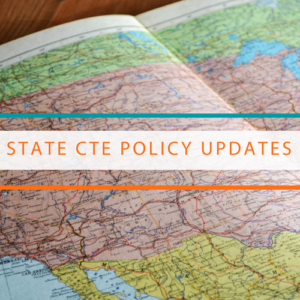Guest Post by Whitney Thompson, Senior Director for Career and Technical Education, Illinois Community College Board

As the third largest community college system in the country, Illinois community colleges serve over 600,000 residents each year in credit, noncredit and continuing education courses. The Illinois community college system, made up of 48 colleges, has over 4,265 active, approved CTE programs spanning across all 16 Career Clusters®, which provide high-quality, accessible, cost-effective educational opportunities to the entire state.
In early 2018, Illinois embarked on the Postsecondary High-Quality CTE Program Approval Project. The goals are to assess existing program development and approval processes, align approval and review systems, identify technical assistance needs across the system, and share lessons learned within the broader CTE community.
This project was initiated just after Illinois went without a budget for close to two years. To add, investments in higher education over the last decade have been decreasing, or at best stagnant. Yet, thriving, modernized CTE programs across Illinois are critical to meeting the state’s goal of 60 percent of all Illinoisans with a postsecondary degree or credential by 2025.
What We Found
Because of Illinois’ challenging fiscal predicament, the colleges were facing significant staff turnover. With this, the system was experiencing a hemorrhaging of institutional knowledge. One major goal of this project, although not as originally designed, became to document practices and processes to build institutional knowledge.

The loss of institutional knowledge was also recognized among Board staff. During the self-assessment of our policies using Advance CTE’s Policy Benchmark Tool, we found that in practice we were upholding quality metrics, but there were a number of critical gaps in “policy” – documented in our Program Approval Manual. In the end, these high-quality practices were being upheld by one to two staff.
In examining our policies at the state level, we found two areas that were “building” or “promising” but not “strong:” secondary-postsecondary alignment and experiential learning. After our state-level assessment, we brought together ten participating colleges to conduct assessments of their own program approval policies and practices, with an additional lens of how they went about developing programs.
While there was some initial resistance to a couple of the elements, namely requiring secondary articulation for all CTE programs and identifying a common set of statewide standards for CTE, largely, the colleges felt it to be a helpful exercise. Similar to our assessment at the state level, the colleges also found that secondary-postsecondary alignment and experiential learning did not meet the “strong” benchmark as desired. Additionally, a few colleges noted that the use of labor market information could be strengthened in the program development process, but more education and training may be needed for staff in retrieving and analyzing this data
Alongside these examinations of our program approval policies and practices, we embarked on research to better understand program development at the campus level. We engaged our partners at the Illinois Center for Specialized Professional Support to conduct fieldwork on each college’s program development process as well as identify needs for technical assistance. Their fieldwork produced a list of areas in which the Board can help the colleges be more systematic in their program development activities and documentation.
Next Steps
While the participating colleges were steadfast for change, we are finding that there may not be enough buy-in from the system at this time to completely revise the program approval policy due to its grounding in administrative rules. However, in the midst of our project, Congress passed Strengthening Career and Technical Education for the 21st Century Act (Perkins V), allowing us to leverage several principles to encourage each and every college to take another step forward.
Specifically, we will be leveraging Perkins V’s calls for smooth transitions (including multiple entry and exit points in programs of study), equitable access and outcomes, alignment to secondary programs, and expanding work-based learning. We look forward to continuing this work well into the future as support for CTE is echoed nationally. Advance CTE has been instrumental in giving CTE a voice on the national stage and supporting states in fostering high-quality CTE programs across the P-20 continuum.
To learn more about Illinois Postsecondary CTE visit: https://www.iccb.org/cte/.
 Many governors leveraged their State of the State Addresses to address CTE funding. In Maine, Governor Janet Mill acknowledged that there has not been significant funding for CTE program equipment since 1998 and asked the Maine Legislature to fund equipment upgrades for CTE programs. In Iowa, Governor Kim Reynolds celebrated expanding high-school registered apprenticeships and proposed $1 million in funding for work-based learning coordinators. Governor Doug Ducey also called for more CTE related funding in Arizona, proposing funding for CTE trade programs aligned with high-demand careers.
Many governors leveraged their State of the State Addresses to address CTE funding. In Maine, Governor Janet Mill acknowledged that there has not been significant funding for CTE program equipment since 1998 and asked the Maine Legislature to fund equipment upgrades for CTE programs. In Iowa, Governor Kim Reynolds celebrated expanding high-school registered apprenticeships and proposed $1 million in funding for work-based learning coordinators. Governor Doug Ducey also called for more CTE related funding in Arizona, proposing funding for CTE trade programs aligned with high-demand careers.

 On the federal and state levels, 2019 was an important year for Career Technical Education (CTE). In addition to creating their four-year state plans for the federal Strengthening Career and Technical Education for the 21st Century Act (Perkins V), at least 45 states and Palau enacted at least 208 policy actions related to CTE and career readiness.
On the federal and state levels, 2019 was an important year for Career Technical Education (CTE). In addition to creating their four-year state plans for the federal Strengthening Career and Technical Education for the 21st Century Act (Perkins V), at least 45 states and Palau enacted at least 208 policy actions related to CTE and career readiness. efforts to coordinate across systems and strengthen career readiness training. Delaware, for example, is building out its capacity to increase postsecondary attainment by scaling regional career pathways and work-based learning. Similarly, Rhode Island is leveraging its
efforts to coordinate across systems and strengthen career readiness training. Delaware, for example, is building out its capacity to increase postsecondary attainment by scaling regional career pathways and work-based learning. Similarly, Rhode Island is leveraging its 

 The CCRC research points out that noncredit programs are also increasing in popularity,
The CCRC research points out that noncredit programs are also increasing in popularity, 
 One of the most significant and exciting changes introduced in the Strengthening Career and Technical Education for the 21st Century Act (Perkins V) is the new comprehensive local needs assessment (CLNA). The purpose of the CLNA is to support data-driven decisionmaking and more closely align planning, spending and accountability activities under Perkins V. The results of the local needs assessment must form the foundation of the local application and drive local spending decisions.
One of the most significant and exciting changes introduced in the Strengthening Career and Technical Education for the 21st Century Act (Perkins V) is the new comprehensive local needs assessment (CLNA). The purpose of the CLNA is to support data-driven decisionmaking and more closely align planning, spending and accountability activities under Perkins V. The results of the local needs assessment must form the foundation of the local application and drive local spending decisions.